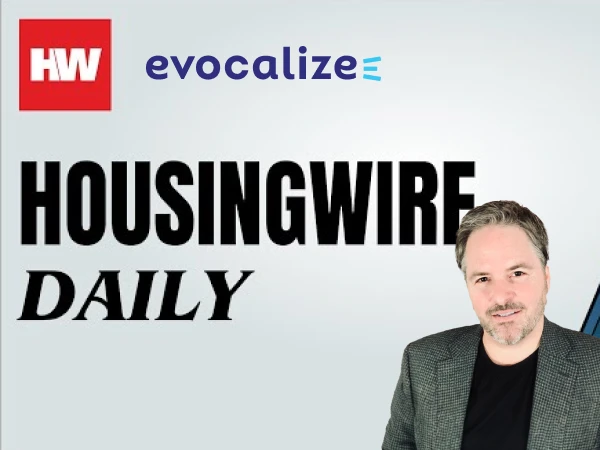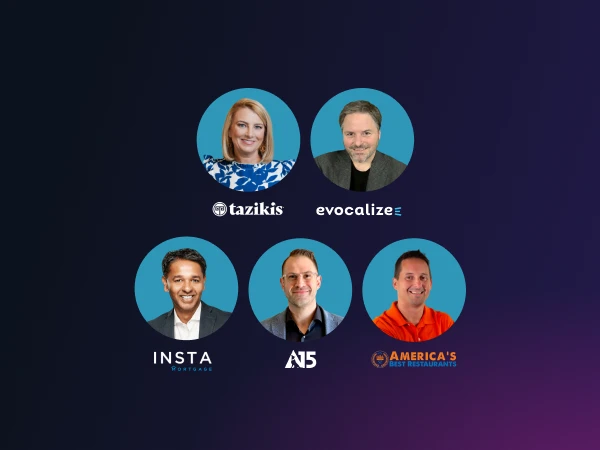
FCC lead generation changes: What it means for real estate and mortgage
Share
Schedule a 30-min marketing strategy call with our team
The Federal Communications Commission (FCC) recently passed new rules to the TCPA (Telephone Consumer Protection Act) that significantly limit how leads can be bought and sold. This closes the so-called “lead generator loophole” that has allowed consumer leads to be sold to multiple parties without express consumer consent.
Matthew Marx, CEO of Evocalize recently went on HousingWire’s podcast to talk about the implications of these FCC lead generation changes, especially for real estate, mortgage, and insurance sectors.

FCC lead generation changes
So what exactly changed? The FCC:
- Banned the practice of comparison shopping sites and lead generators selling consumer contact information to multiple businesses without the consumer’s explicit opt-in consent
- Now requires consumers to proactively check names on a list to share their data with specific companies
- No longer allows a single consent to apply to multiple telemarketers at once
- Closed loopholes that enabled mass lead sharing without individual consumer approval
Essentially, comparison shopping sites and lead generators now must get explicit permission from consumers before sharing their information with any particular business.
This has wide-ranging implications across real estate, mortgage lending, insurance, and many other industries that rely heavily on third-party lead generation sources to drive sales. While intended to protect consumers from unwanted calls and texts, it presents new operational and ethical challenges for many businesses.
These changes demand a more strategic and consent-focused approach to digital marketing, emphasizing the need for platforms like Evocalize that facilitate compliant and effective communication strategies.
Implications for small and large businesses
Across the industry, losing easy access to bulk lead lists will disrupt sales. The costs per lead are likely to rise as lead aggregators attempt to recoup revenues. However, the remaining leads should improve in quality since consumers specifically opted to engage certain brands.
For small businesses, this might initially seem daunting due to increased difficulty in acquiring leads. However, for larger entities, it can be an opportunity to leverage more sophisticated digital marketing strategies and focus on building direct customer relationships.
Staying ahead of the curve
The bottom line is that the days of simply buying leads in bulk then blasting contacts en masse are coming to an end. Personalized, one-to-one consumer relationships are now essential for sales success. So what should businesses do to stay compliant and viable? Here are some top recommendations:
For small businesses:
- Work with your CRM, email, and chat providers to integrate compliant lead-generation technology (get those discussions going now!)
- Tell your tech partners you need automated lead gen capabilities immediately
- If part of a franchise, leverage any built-in funnel systems and best practices
- Start lead generation efforts now to allow time for lead nurturing
For large enterprises:
- Put in place streamlined consumer “check box” flows to share data per FCC rules
- Shift budget away from bulk lead buys toward owned, in-house lead generation
- Leverage personalized content and consumer data to build one-to-one relationships
To navigate these changes successfully, businesses should start revamping their digital marketing strategies now. This includes employing tools and platforms that support compliant, efficient lead generation, and focusing on building genuine, one-to-one relationships with potential clients.
Be sure to listen to the full podcast episode below for additional context about complying with the FCC lead generation changes in regulated industries like housing. Acting rapidly and smartly now is crucial to stay ahead of the curve before enforcement begins.
How Evocalize can help
Evocalize offers an automated, self-service paid marketing platform tailored for multi-location brands. It allows businesses to cost-effectively build their brand, nurture consumer relationships, and generate complaint leads at scale.
Key benefits include:
- Sophisticated, effective paid advertising made simple through easy-to-use software
- Launch marketing campaigns in just a few clicks
- Drive leads by making branded touchpoints with high-intent consumers
- Enables personalization while ensuring corporate brand consistency
- Generates leads over time through nurture flows to maturity
- Compliant database building for sales pipeline success
As traditional lead buying channels dry up, solutions like Evocalize bridge the gap. They empower businesses to take control of digital experiences to drive quality lead generation.
Transcript
Sarah Wheeler:
Welcome everyone. My guest today is Matt Marx, CEO and co-founder of Evocalize, to talk about the FCC’s new rule passed just this week that puts significant restrictions on how leads can be bought and sold and how this is going to affect those in real estate and mortgage. Matt, welcome to the podcast!
Matthew Marx:
Hi, Sarah Wheeler. Thanks for having me on.
Sarah Wheeler:
Great to have you on. And we have a very important topic to talk about today, very timely which is the FCC just made a pretty big change in lead gen and how that works. Can you bring us up to speed on what happened?
Matthew Marx:
Sure thing. It’s interesting with everything going on and rates starting to, starting to maybe fall a little bit and, and the lawsuits and real estate pretty big change went under the radar, I think yesterday.
So the FCC issued an order amending their express consent rules for the TCPA, which is the Telephone Consumer Protection Act that was initially passed way back in 1991, but has had amendments through the years to kind of keep up with the times a little bit. And so the biggest thing that did a number of things yesterday but the biggest thing that was passed in our world is the closing of what they call the “lead generator loophole”.
And that’s effectively closing this one-to-many, I collect a lead and I sell it to lots of people who can then contact the consumer. It’s effectively what that means.
Sarah Wheeler:
So, you know, we know this is a pain point for consumers and we’re all consumers too, right? If we’re in the industry, and even if this is how we generate leads or work off leads, no one likes to get like a hundred calls.
They don’t want to get spammed at the same time. There is, you know, it makes it easier for the consumer when someone reaches straight out to them, or they can go straight to, you know, a company that, that solves their problem. So how do you think about what this means for not just the industry, but for the consumer?
Matthew Marx:
Yeah, I mean, I think as people first, I like to think about this as a super positive change, right? So if you’ve ever submitted an online lead, I know I’m reticent to submit online leads because I’m nervous about the ramifications of that. And the spam, you know, we already get a ton of calls, texts, emails every day from folks that we’re not looking to talk to immediately, right?
And so, from a consumer’s perspective, I think, having a 1 to 1 intentional relationship with someone that you’re expressly saying, I want to talk with this business or this person and then having them be able to contact you, but not be inundated is a good thing.
I think that’s a personal kind of a return to a personal one-to-one connection. But wow, there are a lot of ramifications throughout the ripple effect throughout the industry with these changes.
Sarah Wheeler:
So the change says that you have to get consumer permission to share the lead, is that correct, with every single person you would share it with?
Matthew Marx:
That’s right. So the nuance here will be what constitutes a “named business” at what level of a hierarchy is it? Could it be a holding company? Could it go all the way down to the SMB? But what we know is that just to back up a little bit, the way comparison shopping websites, portals, aggregated lead rep, resellers have worked for many years.
They built very profitable businesses by doing a bunch of marketing, getting a customer’s interest in, say, rate information, or this crosses industries, right? And gathering that customer’s lead information – contact information and then. And then selling it to folks who are bidding on it, sometimes in advance and named, but oftentimes after the fact.
And sometimes that lead is not only sold 1 time, but sold dozens, maybe even 100s of times. And sometimes that lead is sold immediately, which is most valuable. And sometimes it’s sold as an aged lead, which is over time. Right? And so this way, these you know, lead aggregators have made a ton of money because you can take one lead from one customer expressing intent and sell it lots of times, right?
And so that’s what was happening. Now, the FCC has actually given some examples of what they expect in the new world. And that’s that world looks again, one to one. So if I’m a comparison shopping portal or site, I can do marketing, get someone to come in and give their information, but I can only collect their information and give it to the people that they expressly permit me to give it to.
So, what that means is, and they used as an example, a checklist with the people that I would approve to give businesses that I would approve to give my lead to being a subsequent part of that lead generation flow and and all other parties that would normally get access to that lead being excluded other than the expressly named businesses that were approved by the consumer.
Sarah Wheeler:
Wow. I can see how difficult this is. Number one to execute for the companies on the company side, but also just what this might look like. So do you feel like it’s going to be like, kind of like, you know, we do with cookies now where it’s like, except all cookies, like, yes, okay, just opt me in or whatever, or it sounds like it’s going to be much more granular than that? Like we have to pick as a consumer, what you want to get, who you want to hear from?
Matthew Marx:
I think the FCC anticipated that Sarah, so, you know, we’ve made some posts at, at my company, Evocalize about this topic over the last few days as the ruling kind of was finalized yesterday. And it’s been percolating.
The rules have been known and anticipated passing since late November. So we’ve been kind of starting to prepare for this a little bit. But but yeah, I mean, I think the context here is: the FCC even was prescriptive and suggested a remedy of the named checklist where it would all be blank.
Think about a form with a lot of checkboxes on it with names of businesses, small and large associated with them. And the consumer and them all being blank and the consumer before the lead information went anywhere, having to expressly go in and say, I want them to call me them to call me and them to call me.
Sarah Wheeler:
Wow, so let’s talk about some of those ramifications. Okay. So if you’re a small business you know, maybe are you going to be now maybe missing out on if somebody doesn’t know who you are, right? Like, if you’re, if you’re a small-to-medium sized business, and there’s say, let’s just say a very big retail lender on there or somebody else that everyone’s familiar with. Does that put you at a disadvantage?
Matthew Marx:
Well, I think there was 1 dissenter on the vote. I think the vote was in the FCC was a 4 to 1 vote if I’m not mistaken. And there was one dissenter and that was their claim that there’s going to be a significant harm to small businesses. And, you know, that can harm them in an economy that’s, you know, in our industry, at least is challenged at the moment.
And so I think that’s the claim I would say that I think things will change, but I think, you know, in the short term there can be some pain associated with that. And I can explain what I mean by that. In the mid and long term, I think this has a chance to rebuild trust with consumers for online leads, increase the quality overall and build a one-to-one relationship with consumers.
So, yes, I think there can be some short term disruption because the easy button for small businesses and just buying leads. If you’re a loan officer, I just want to buy a bunch of leads that are in my area or if I’m a real estate agent, I want to go to a portal and buy a bunch of leads. That spigot is going to first, get much more expensive, and second, the leads that you’re going to get are going to shrink in volume likely in six months when the enforcement starts for this action. So there are lots of things you can do, but definitely I think those are likely outcomes.
Sarah Wheeler:
So it strikes me that you know, one of the things that people who buy leads know is that so many of those leads aren’t very good. Right? I mean, it’s the quantity over quality. So in this scenario, at least, yes, they might be more expensive, but they would actually be qualified leads because that person has said, I want to hear from you.
Matthew Marx:
Yeah, I think that’s true, Sarah. The thing though that you’ll have to look at is it worth paying the premium that you’re going to be paying? Because think about the lead aggregation site. They’ve just lost what 5X the revenue, whatever the revenue ends up being for each given business.
And so you’re going to have to increase prices pretty significantly. I would expect on the 1 lead. And so, if that one lead costs you a $1000 or $2000 or $5000 dollars, is that viable in the future? So we just don’t know how that will play out exactly. But I think it would be surprising to me if costs don’t go up significantly.
And then the question will be, what’s the quality trade off? I think there are other tactics that SMBs should employ or can employ now. And can, should kind of be working on them quickly to prepare for this. But yeah, I think you’re right. I think the quality will go up, but the price will go up too.
Sarah Wheeler:
So does this apply across the different formats? Like, so that’s like contacting them by phone or email or text or like anything?
Matthew Marx:
Yeah, it’s think of it as one-to-one contact, right? So it’s gone from a one-to-many from a “I’m a consumer and I’m submitting my lead information that’s going to go to lots of people that I don’t know who they are” to a, “I’m submitting my lead information. It’s going to go to one person who can talk to me” and expressly named our robo calls, text messages, but kind of included in the purview. We all think our emails and other forms of communication as well, right?
Sarah Wheeler:
You wouldn’t want to get on the on the wrong side of this. So they’ve given six months to put this into place. Correct? That puts us. That’s right. I don’t even know. What does that put us at? May?
Matthew Marx:
Summer. I mean, the summer is you know, going to potentially be the time between now and the summer is going to be a little bit of chaos for lots of folks in the lead space because of this.
Sarah Wheeler:
So what are you advising your clients to do? What should, you know, real estate agents and mortgage lenders specifically, what should they be doing right now?
Matthew Marx:
Yeah. So Evocalize we’re on kind of both sides of the coins. Our technology serves the lead aggregators and the portals and helps them generate leads out of the paid marketing channels like TikTok and Google and Meta.
But we also serve the SMBs to put in place their own funnels and their own lead generation and nurturing systems in order to gather their own leads. So on one side, I expect that will be we’re advising our portal partners to put in, start to explore, talk with council, look at putting in place the lowest friction, but most compliant type of checklist that that will emerge with the lowest friction to the consumer in that user flow if you can think about the user experience there.
On our SMB client side, we’re encouraging the franchise systems, the tech providers, service SMBs to help them solve the problem by putting in direct lead generation systems because they can do what the lead aggregators are doing. They just need to start a little ahead of time because when they generate their own leads, they need to nurture them for a period of months, in some cases, before they matriculate into sales.
And so those folks are generally a little earlier in the buying cycle. And so you need to kind of start now for, you know, looking at 6 months down the road.
Sarah Wheeler:
So, if you’re part of a franchise, do you feel like that’s an advantage because they’re big enough to have their own funnel systems already built out? What is the alternative for people who don’t have that?
Matthew Marx:
Well, I think the tech providers in the industry need to help businesses solve this, right?
And so your CRM system, if you have a CRM system outside of a franchise network, if you have email marketing or chat systems, all of those systems should be incorporating paid lead generation technology, if they don’t already have them into their solution so that it’s all seamless for you. So you don’t have to spend a bunch of time figuring out the tech or any of that. They make it all in one and seamless. So if you don’t have that, go tell them as an SMB I need this now.
And then the second thing I would say, if you’re a part of a franchise system, yeah. So Sarah, to answer your question, I do think it’s an advantage because the franchise systems can move a little more quickly in providing tools, the pre-built flows with best practices in them to their franchisees, so that it’s more turnkey for the entire network to work together to lead generate versus, again, what folks were doing, which was the easy button going in, just buying buckets of leads that came to them every day.
The benefit of this is once you get it going, it’s a far more efficient and cost effective way of doing it even today.
Sarah Wheeler:
So, you know, I think that this was widely anticipated in some ways, or at least we knew it was a total possibility. Have you already seen different companies taking action ahead of the actual…?
Matthew Marx:
I think people are trying to figure…I think we anticipated it, but there’s so much else going on in these industries right now with the buyer commission lawsuits in real estate and mortgage rates hitting, and listing inventory – you know, all the things that you talk about, to me, have taken the headlines and this has flown under the radar for a lot of folks.
So I think folks now are starting to scramble as the first folks to talk about it in addition to us really, the law firms, right? Because the legal industry stands to make a lot of money here too. Right? And advising people what their adjustments should be based on this ruling.
So that’s what the first series of news articles and things that are coming out, but we really need to get the industry educated. Otherwise, folks are going to look up in April and May, and this is going to come at them like a brick wall.
Sarah Wheeler:
And also, I mean, like, to your point, so we know that most people shopping for a home, they start doing, you know, there’s behavior that they exhibit, what, eight months ahead of time, where they start looking online.
There are all these cues that they’re in the market. So if this takes effect in, you know, six months, then you’ve got to be working now to get that funnel, right? Like, I mean, there are people in the funnel right now. Are you going to grab them or not?
Matthew Marx:
That’s exactly right. And I mean, again, the benefit of doing it yourself is you can get ahead of the portals like the the big social media platforms in Google and the advertising platforms are democratized spaces, right?
They just take a dollar. Every dollar is the same from everyone. And so you can actually get ahead of the portals and build a relationship first. But you’re right, Sarah, you have to start doing it now, regardless of how you do it, because you need to start adding them to your contact database, having nurture funnels and flows associated with them to matriculate them down.
So that again in, to your point in six months, you have a ready lead pipeline. If these leads dry up from the resellers, like we anticipate them doing at some, to some level.
Sarah Wheeler:
It’s amazing to me, I think that you, this is such a universal experience that consumers hate to be slammed by all these people because there’s so little getting through right now, you know, at the federal level.
And I know, obviously this didn’t didn’t take Congress, FCC could act on their own here, but usually in an election year, I would be like, okay, well, you know, do we think there’s any, you know, is this going to change, you know, depending on the election in a year from now, but I feel like when it comes to consumer things like this, I mean, there’s so much consensus, right?
Matthew Marx:
Yeah, I mean, there may be legal challenges. So that’s the thing. We don’t know yet. You never know what challenges there could be to this ruling. But I think everyone is experiencing some degree of pain on a personal level from spam calls, robocalls, robotexts, emails.
I don’t know about you. My email inbox, my phone is filled up with texts every single day. And it takes, you know, an hour a day to unsubscribe to everything that’s sending me notes. And so in a personal level, I sympathize and I think American voters and consumers, sympathize with this and roundly support this ruling.
So, but it’s going to cause us in the industry, you know, certainly in different portions of the industry, some challenges in, as I mentioned a time, that’s already pretty challenging.
Sarah Wheeler:
So, you know we’ve talked about real estate and mortgage specifically, you know, what about insurance insurance seems like one of those, you know, ripe for this kind of thing to affect.
Matthew Marx:
I think insurance, auto, health – because this lead aggregator business model, you know, when you can sell the same good, the lead, over and over and over and over again. And it has value for a long time. Because the consumer expressed intent and there are, you know…
If I look for rates, for instance, and I’m a lead aggregator and I’m a consumer submits their interest for rate information. Okay. Now I have a pretty darn good signal that person is looking for mortgage services. They’re looking for real estate services. They’re looking maybe to move. So I’m looking at insurance. Maybe I’m looking at auto. Maybe I’m looking at schools, private schools. This ripples pretty far down across basically every industry.
And so, yeah, I mean, it’ll have a wide-ranging effect. We do a lot of our business in mortgage and in real estate. So we think about that first probably, but this definitely applies across lots of spaces.
Sarah Wheeler:
It’s so funny because I, I know exactly where I gave my information. I can trace it to the day I gave my information to this one place. And since that day, it’s been like, eight months. I am spammed on a regular basis. It’s so frustrating.
And a lot of, to your point, a lot of the calls I’m getting are about Medicare and I’m like, “Okay, I am not a spring chicken, but I am not yet qualified for Medicare.” And yet I get multiple calls every day.
And I’m like, that’s such a waste of money for everyone involved. I’m not eligible. I couldn’t sign up if I wanted to. And yet all of these companies are paying all these people to call me, which, you know, it irritates me on the other end, but like, when you think about lead quality, this really could be a net good for everyone going forward once we can, you know, adjust to it.
Matthew Marx:
Yeah, you definitely wouldn’t have checked the box for like, whatever Medicare provider is going to reach out to you. Right?
Sarah Wheeler:
No, I would not. I would be like, no, please don’t do that. I have some years. So you’re just wasting my time, you know, so what are you doing at Evocalize to help, you know, you’re one of the people that, you know, clients might be like, okay, we need your help to solve this. What does that look like for you guys?
Matthew Marx:
Yeah, well, we have a marketing automation platform, paid marketing automation platform that a lot of the real estate industry and some of the mortgage industry uses either through their franchise network or through their tech provider, like their CRM.
Often we’re white labeled, so folks don’t know that it’s Evocalize running things, but we provide kind of self-service, turnkey paid marketing capabilities that allow you to build your brand and generate your own leads within the tools that you already use or within the context of your franchise system. And so it can be compliant, it can be turnkey, can be fully automated. Right?
And so we’ve held this view. I mean, we had so much conviction. We raised a bunch of money and built a company years ago on it. Like we’ve always felt like the spamminess of lead generation was going to go away at some point, the consumer is going to win out.
And so we encourage folks to try and make your impact. Try and be the expert, right? Try and make the early connection one-to-one with people with data and knowledge and your expertise in the market. What are rates going to do? A lot of the stuff that you talk about Sarah Wheeler with Logan and the team on your podcast, right? Like use knowledge to make an impact.
And you just have to today generally can do some organically, but you generally need to pay for some of that reach. Because the Facebooks of the world and the Googles, they want to make money. And so we bridge that gap. We allow you to put your content in and the franchisor can put their content in and data, and we help you with best practices, messaging. We simplify it all. So there’s targeting and all that stuff. You don’t have to worry about any of that. And you can run marketing and that’s that works pretty well to generate leads.
Sarah Wheeler:
Well, it sounds like you’re well-positioned for this. I’m sure there are some, you know, some other people I can think of very, very quickly that, you know, this is going to be a challenge, but I’m sure they’ve also been, you know, gearing up for it.
I had our June on this this week about building your personal brand and from my perspective already in this market, it’s like, your relationships are so much more you know, relevant than whatever leads you’re buying generally speaking. And this just, I feel like underlines that again.
Matthew Marx:
I think you’re dead on again. I think, as I mentioned at the beginning, and you’ve alluded to, I think the one-to-one connection, the personal connection is what we all strive for. It’s what we used to do in-person before digital, right? We used to go shake someone’s hand and earn their trust.
And so the digital world has just strayed from that. And I think this is a reset that hopefully gets us back and earns trust again. And I think it will, but it’s definitely going to be a disruption and it’s going to be a disruption for some of our portal and marketplace partners too.
So we’re not immune to that, but yeah, I think at the end of the day, what’s best for the consumer wins the day most of the time. And I think as we’ve talked about today this will end up being a win for the consumer.
Sarah Wheeler:
I agree. I just wish there was a way we could get the federal government to sort of, you know, work together so they’re like, okay, we’re throwing this at them and this at them. We’re going to wait on this. And we’re just going to have this nice timeline of all the things that are going to happen. That will never happen I realize.
Matthew Marx:
Centralized planning from our representative to democratic government, I don’t know.
Sarah Wheeler:
Never happened. Matt, thanks so much for being on today, giving us insight here. And we will be closely watching this and also have you again on and you know as it comes to closer to being enforced and what that looks like. So thank you so much.
Matthew Marx:
Thanks so much for having me on Sarah Wheeler. Appreciate it.
Share
Subscribe to our blog
Don’t miss a beat in the fast-changing local digital marketing landscape — sign up to stay ahead of the curve!






